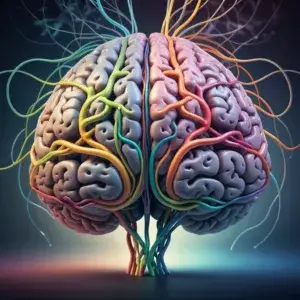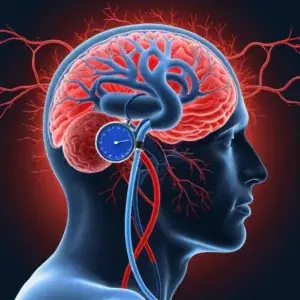Table of Contents
How Stress Affects Our Brains
Before we even think about what are the best stress management techniques for brain health, what is stress? And how does stress really affect our brain health and our cognitive function?
Some stress can be healthy stress. Like the stress created from a good physical workout. But stress can also be negative like the chronic stress created from being overworked and overtired. And this is why we need stress management techniques for brain health and maintaining our cognitive function at an optimal level.
When I think about stress, I imagine it as an uninvited guest that sometimes overstays its welcome. It’s not just a fleeting moment of worry or a quick heartbeat. Stress, especially when it lingers, can leave a significant imprint on the brain. To grasp why managing stress is so crucial, I find it helpful to start by looking at what exactly stress is and how it affects us.
Our bodies react to stress through a series of physiological responses: the release of adrenaline and cortisol, an increased heart rate, and quickened breathing. These are natural reactions intended to help us in the face of immediate threats. Yet, the problem arises when these reactions don’t switch off, leading to potential risks for our mental health.
Chronic Stress and our Brain Function
Chronic stress, the kind that seemingly blends into the background of our day-to-day life, can disrupt synaptic regulation, leading to memory problems and a decrease in cognitive flexibility. Over time, it may even reshape the brain’s structure, contributing to anxiety or depression. Without stress management techniques for brain health, chronic stress gradually wears away at our ability to function effectively and affects our mental health and cognitive function in a negative way.
Beyond the day-to-day concerns, there’s the bigger picture to consider. Research suggests that prolonged stress might increase the likelihood of developing neurological disorders like Alzheimer’s disease. It paints a clear image: managing stress isn’t just about feeling better in the moment; it’s about protecting our long-term brain health.
Now that we’re familiar with how stress can influence the brain, the question stands: How do we handle it effectively? With a strategy tailored to individual needs and backed by science, anyone can take steps to mitigate stress and build a resilient mind. The following section turns to those fundamental stress management strategies that form the bedrock of a healthier lifestyle and better brain function.
Fundamental Stress Management Techniques for Brain Health
Knowing what pushes your stress buttons is a vital first step. When I’m talking to clients, I encourage them to keep a stress diary. You jot down instances when you feel stressed, noting the triggers that sparked the feelings.
What you eat profoundly affects your brain health. I always say, think of your diet as fuel for your cognition. Foods rich in omega-3 fatty acids, like salmon, and those with antioxidants, such as berries, can enhance brain function and reduce stress.
Don’t underestimate the power of physical activity. Even a brisk walk can do wonders for stress levels. Exercise releases endorphins, which are known as nature’s mood lifters. It also increases blood flow to the brain, which is beneficial for cognitive function.
Mindfulness is another tool I strongly advocate. It’s about remaining in the present and observing your thoughts without judgment. Starting with just a few minutes of meditation a day can be incredibly beneficial for calming the mind.
Finally, sleep cannot be ignored. Consistent, quality sleep is crucial for brain health. It’s when your brain clears out toxins and consolidates memories. Aiming for 7-9 hours a night is optimal. If you have trouble sleeping, consider establishing a bedtime routine and a sleep-friendly environment.
Advanced Stress Management Techniques for Brain Health
You’ve covered the basics and established a foundation for managing everyday stress. But sometimes, you might seek more sophisticated methods to fine-tune your brain’s response to stressors. Let’s explore some advanced techniques that can further improve your well-being and mental resilience.
Cognitive-behavioural therapy (CBT) goes beyond traditional talk therapy by coupling talk with actionable strategies. It’s like a workout for your thought patterns, equipping you with techniques to challenge and change unhelpful behaviours and beliefs.
In the realm of personal feedback mechanisms, biofeedback and neurofeedback stand out. These techniques give you real-time data on your physiological functions. It’s like having a conversation with your brain waves, heart rate, or muscle tension, learning how they respond to stress, and then actively working to bring those readings into optimal ranges.
A whiff of lavender or peppermint might do more than just please your senses. Using aromatherapy and essential oils is an olfactory method to transport your brain to a calmer state. Think of essential oils as messengers that can signal your brain to lower the shields and relax.
If you consider your body a temple, why not try yoga or Tai Chi? These ancient practices blend physical postures with focused breathing and meditation. Studies suggest these disciplines can bolster your mental fortress against stress.
Lastly, for those who are inclined towards the expressive arts, art therapy offers a constructive outlet. This isn’t about creating a masterpiece for a gallery; it’s about using the creative process to explore and communicate feelings you might otherwise struggle to express.
Creating Your Stress Management Plan : Putting it All Together
After exploring various techniques to manage stress, it’s time to construct a personalized plan. This process starts with acknowledging the unique pressures you face in daily life. Stress is inevitable, but what matters is your response to it. Focusing on achievable strategies that address both your mind and body will have a significant impact on your well-being.
Begin by pinpointing the areas where you experience the most tension and set tangible goals to address these issues. For instance, if your sleep quality is suffering because of stress, your objective might be to improve your bedtime routine by incorporating relaxation exercises.
Integrate the stress management techniques discussed earlier into your schedule in a way that feels natural and sustainable. Consistency is key, so even small, daily practices can make a major difference over time. Remember, caring for your mental health is equally as important as managing physical stress.
Keep track of your progress through a journal or app. If a particular strategy isn’t working after giving it a fair chance, don’t hesitate to try something new. Flexibility in your approach will enable you to find the best fit for your needs.
If you find that you’re struggling to manage stress on your own, consider professional help. Mental health is crucial, and sometimes guidance from a therapist or counsellor can offer new perspectives and additional coping mechanisms. Your brain’s health is vital, so invest in it by choosing the right strategies to keep stress at bay.
Resources
- Mindfulness-Based Stress Reduction for Healthy Individuals
Journal of Psychosomatic Research, 2017
Link - Effects of Physical Exercise on Anxiety, Depression, and Sensitivity to Stress: A Unifying Theory
Clinical Psychology Review, 2013
Link - The Impact of Yoga on Mental Health: A Systematic Review
Journal of Psychiatric Practice, 2013
Link - Stress, Meditation, and Antidepressant Response
Nature Reviews Neuroscience, 2018
Link - Cognitive Behavioral Therapy and Stress Management in the Workplace
Journal of Occupational Health Psychology, 2015
Link









This article brilliantly captures the essence of how stress impacts our brains and overall well-being. I particularly appreciate the analogy of stress as an “uninvited guest” – it’s so relatable! The physiological explanation of stress responses like the release of adrenaline and cortisol, along with the long-term risks to brain health, really underscores why managing stress is vital.
I found the emphasis on fundamental strategies, such as keeping a stress diary and focusing on diet, exercise, mindfulness, and sleep, to be incredibly practical. These are all manageable steps that can fit into anyone’s daily routine. It’s great to see a holistic approach that combines both physical and mental health. Overall, this article provides a comprehensive guide that’s both informative and actionable. Thanks for sharing such valuable insights!
Hello. I think that these are very helpful tips for people that are stressed which is probably the strong majority of people. Because life is pretty darn hard and stressful. Nobody’s really talking about how to deal with the negative effects of stress which are so cumulative. So this should be helpful for anybody that’s dealing with this.
Thanks for stopping by Jake, You are definitely correct in saying that the effects of stress are cumulative. There are also 2 different types of stress – long-term chronic stress and short term acute stress. When our levels of long-term stress stay too high for too long it makes it that make harder to deal with any extra short term stress and the effects on our health and mental wellbeing are that much greater.